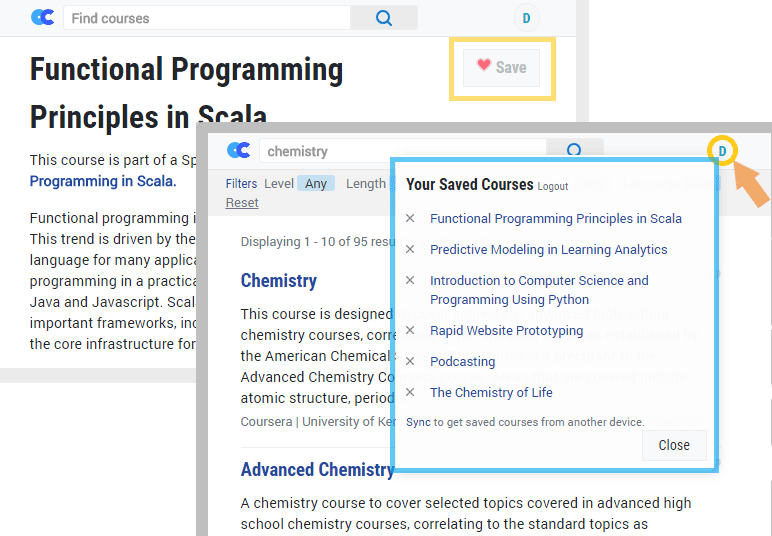 Not long ago, you might have wondered if an online course existed about a given topic. Today, with well over 15,000 online courses available, you might have an entirely different concern—which course of many on a topic is most suitable for you?
Not long ago, you might have wondered if an online course existed about a given topic. Today, with well over 15,000 online courses available, you might have an entirely different concern—which course of many on a topic is most suitable for you?
In this post, we'll discuss ways you can quickly evaluate courses so you can spend less time browsing and more time learning from online courses. Let's dive in.
Know what you want to learn
Before you can make use of any of our tips, you should spend a few minutes to reflect on what you're hoping to achieve with an online course. Ask yourself:
- What specific skills do you want to acquire?
- What kind of knowledge do you want to develop?
- Which specific tools or methodologies do you want to learn how to use?
Think of your answers to these questions as a guide or grading rubric against which you can evaluate each course you come across. Once you've taken stock of your needs and goals, you'll be better equipped to take advantage of our tips below.
Course descriptions are your friend
These descriptions are short blurbs about courses written by the very instructors who designed and authored them. Knowing what to look for in a description can help you make an informed decision on whether a course will be worth your time and money.
Having read a thousand plus course descriptions ourselves, we've found it most helpful to look for:
- Learning objectives
- Tools, methods, and techniques used
- Intended audience and prerequisites
- The overall "quality" of the description itself
Learning objectives tell us what skills or knowledge we can expect to have by the end of a course. These alone can help us rule out unhelpful courses. If you're looking to take a course in a more technical or specialized field, you'll also want pay attention to the specific tools, methods, and techniques that are taught and used in a course.
As you skim through the description, it helps to self evaluate your level of expertise on a topic and then see if you fall within a course's intended audience. Some instructors explicitly describe their audience or list out prerequisites, but many others simply allude to the target audience. For the latter, pay attention to the language in the description itself. A description packed full of jargon that remain undefined might mean a course geared towards advanced learners. Similarly, a course described in layman's terms may be more introductory in nature and meant for a broader audience.
Finally, not all course descriptions are made the same. While most are written honestly, intended to help you make the best decision, some will happily spin themselves for a sale. Be wary of descriptions that sound like marketing pitches and employ some skepticism when a course seems too good to be true (e.g. learning many things in a short amount of time). These courses might be good, but there might be another better tailored to you.
Course metadata are also your friend
Next to each course description is a table filled with useful course metadata. From here, you can find out who's teaching your course, the universities and institutions backing it, and valuable data points like effort required (hours per week and total length in weeks) and cost.
If you're running on a tight budget, schedule, or both, then you can save a great deal of time looking through the table first before doing a deep dive on the course description.
Create a shortlist
Just as you might add a few items of interest to a shopping cart on Amazon, you can also add courses you're thinking about taking to your course list. If you're looking to learn a popular topic, you'll inevitably come across many viable courses. Use the "Save" feature to add courses to your list that you can review later.
 Don't be afraid to double up
Don't be afraid to double up
Let's say you started with 8 courses and you've managed to whittle down your list to two or three. That's a great start–a dilemma or trilemma is better than an octolemma!
If you're still undecided, we encourage you to sit in on a few courses at once. Doing so gives you a closer look at each course. You'll get an opportunity to see how instructors lead a course, see whether the course clicks with your learning style, and explore components of the course like homework assignments and discussion communities that you otherwise couldn't from just looking at the course description.
Almost each course we list on OpenCourser offers a free trial as well—usually at least a week long—so there's no financial downside to testing out multiple courses before settling on one. Just be sure you have enough time to properly assess all of the courses you take simultaneously so you can make the most informed decision possible.
Choosing "the one"
These tips are designed to help narrow your choices and choose a course that best fits with your goals. For many, the best choice usually surfaces to the top fairly quickly. For others, it might take a bit more time comparing different courses and researching options, including non-course alternatives like books, videos, tutorials, and in-classroom offerings.
Although the main point of this post is to help you unearth that most optimal course, finding the absolute ideal course is just one part of the equation. Chances are, unless you complete many courses at once, you'll probably never know if you landed on "the one," so don't fret if you aren't feeling 100% sure about a course you're thinking about taking. You're likely doing pretty well already choosing a course if you're following the tips we've outlined here.



